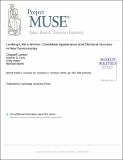| dc.contributor.author | Lawson, J. Chappell H. | |
| dc.contributor.author | Lenz, Gabriel Salman | |
| dc.contributor.author | Baker, Andy | |
| dc.contributor.author | Myers, Michael | |
| dc.date.accessioned | 2012-05-24T14:56:54Z | |
| dc.date.available | 2012-05-24T14:56:54Z | |
| dc.date.issued | 2010-10 | |
| dc.identifier.issn | 0043-8871 | |
| dc.identifier.issn | 1086-3338 | |
| dc.identifier.uri | http://hdl.handle.net/1721.1/70919 | |
| dc.description.abstract | A flurry of recent studies indicates that candidates who simply look more capable or attractive are more likely to win elections. In this article, the authors investigate whether voters' snap judgments of appearance travel across cultures and whether they influence elections in new democracies. They show unlabeled, black-and-white pictures of Mexican and Brazilian candidates' faces to subjects living in America and India, asking them which candidates would be better elected officials. Despite cultural, ethnic, and racial differences, Americans and Indians agree about which candidates are superficially appealing (correlations ranging from .70 to .87). Moreover, these superficial judgments appear to have a profound influence on Mexican and Brazilian voters, as the American and Indian judgments predict actual election returns with surprising accuracy. These effects, the results also suggest, may depend on the rules of the electoral game, with institutions exacerbating or mitigating the effects of appearance. | en_US |
| dc.language.iso | en_US | |
| dc.publisher | Cambridge University Press | en_US |
| dc.relation.isversionof | http://dx.doi.org/10.1017/S0043887110000195 | en_US |
| dc.rights | Article is made available in accordance with the publisher's policy and may be subject to US copyright law. Please refer to the publisher's site for terms of use. | en_US |
| dc.source | MIT web domain | en_US |
| dc.title | Looking Like a Winner: Candidate Appearance and Electoral Success in New Democracies | en_US |
| dc.type | Article | en_US |
| dc.identifier.citation | Lawson, Chappell et al. “Looking Like a Winner: Candidate Appearance and Electoral Success in New Democracies.” World Politics 62.04 (2010): 561–593. Web. © Cambridge University Press 2010. | en_US |
| dc.contributor.department | Massachusetts Institute of Technology. Department of Political Science | en_US |
| dc.contributor.approver | Lawson, J. Chappell H. | |
| dc.contributor.mitauthor | Lawson, J. Chappell H. | |
| dc.contributor.mitauthor | Lenz, Gabriel Salman | |
| dc.contributor.mitauthor | Myers, Michael | |
| dc.relation.journal | World Politics | en_US |
| dc.eprint.version | Final published version | en_US |
| dc.type.uri | http://purl.org/eprint/type/JournalArticle | en_US |
| eprint.status | http://purl.org/eprint/status/PeerReviewed | en_US |
| dspace.orderedauthors | Lawson, Chappell; Lenz, Gabriel S.; Baker, Andy; Myers, Michael | en |
| dc.identifier.orcid | https://orcid.org/0000-0002-8174-8728 | |
| mit.license | PUBLISHER_POLICY | en_US |
| mit.metadata.status | Complete | |
